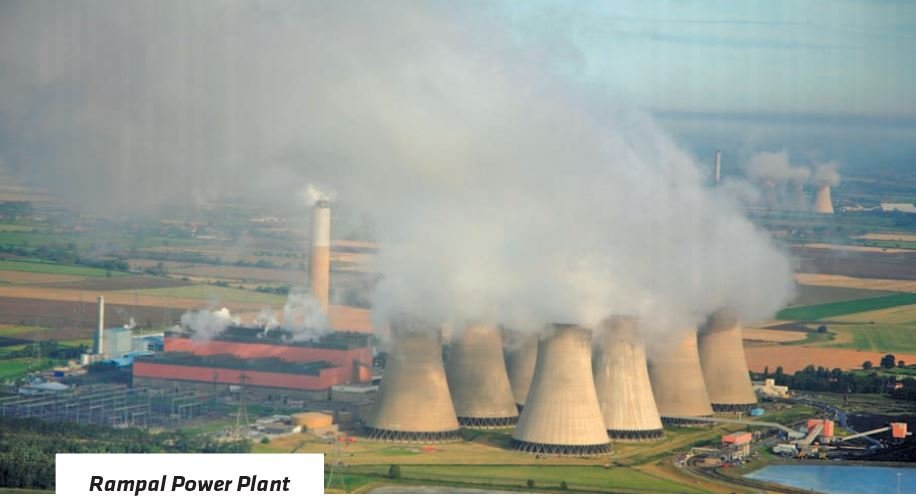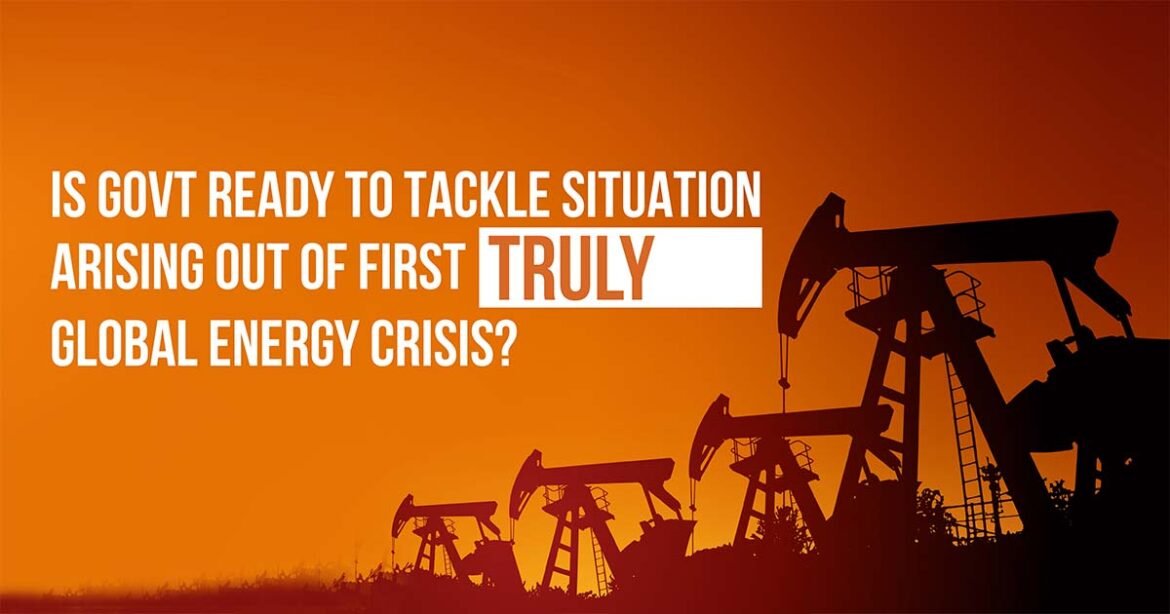The widespread energy crisis around the globe resulted from the ongoing war in Europe is exerting tremendous pressure on both rich and poor nations with the serious cost-of-living challenges. Bangladesh is no exception. Many expressed worries that the global energy crisis could hit Bangladesh badly in the year to come upon following both the developed and underdeveloped countries’ struggle to cope with energy shortages. In the context of such a truly global energy crisis, Mohammad Rafiul Hassan writes as to what steps have Bangladesh government taken and what should be done.
The ongoing Russia-Ukraine war in Europe has made the energy crisis widespread around the globe. It is because Russia provided 40 percent of Europe’s gas before the war began. It ENERGY also supplies 12 percent of world’s crude oil, and half of that went to Europe. The war and the subsequent sanctions have created a partial supply shortage in most European countries. As a result, gas, and electricity prices have gone up by 40 percent in Europe and the high European gas and oil price is dictating prices all over the world.
You can also read: Bangladesh Bank launches liquidity support to Islamic banks
The biggest challenge is now faced by the import-dependent developing countries. This year China and India have reduced their LNG imports by 20 percent and 14 percent, respectively, compared to the previous year. India suffered a widespread power outage. Pakistan reduced its work days to five a week and is restricting commercial power usage. Sri Lanka depends 60 percent on imported fuel for its power production. Its mismanaged economy and almost empty foreign currency reserves have put the country into chaos.
Even the advanced Asia and Oceania countries are facing difficulties. Apart from rate adjustment, Singapore chartered floating vessels for LNG storage to ensure supply. Japan is going for major demand-side management by asking citizens not to use air conditioners. The Australian energy minister has requested the residents not to use electricity for two hours in the evening. Apart from some energy producing countries, every country is scrambling for austerity measures. Like other countries, the recent crisis has adversely affected Bangladesh as well. The government of Bangladesh mulls various measures to meet the energy deficit. In the short term, the government has urged people to be aware of the use of energy and to adopt frugality at the public and private levels, while in the long run, increased energy production is the prime concern.
The result of the far-reaching initiatives of the government through the establishment of Payra, Rampal and Ruppur power plants is obvious. The production has already started this year at Payra and Rampal power plants and the Ruppur nuclear power plant is almost ready for power generation. Taking into account the future global crisis, the government also seems to be active in extracting domestic resources such as oil, gas, and coal. The government has taken some other measures to tackle the ongoing crisis. What are those measures and how effective will the measures be, we may see.
AUSTERITY MEASURE
On July 18, several austerity measures were decided upon during a high-level meeting at the Prime Minister’s Office (PMO) in order to deal with the current crisis. To save fuel energy, the government decided to shut down diesel-run power plants temporarily which contributes almost 6 percent to the country’s total electricity production capacity. Other measures include area-wise load shedding across the country, shutting down petrol pumps one day a week and reducing the consumption of electricity by 25 percent in government offices. Besides, the government urged the country people to maintain austerity in energy uses and power consumptions.
Badrul Imam, energy expert and former professor of geology at Dhaka University however, opposes the government’s decision. According to him, a comprehensive assessment of the situation was not done before deciding to shut down the power plants. He belives that despite the closure of the plants, diesel use in other sectors is bound to rise due to the crisis. The generators that we use in our farms, factories and homes – they all run on diesel.

Load shedding will only increase the use of the fuel in these generators, he said, adding that this was a piecemeal decision and our problems can’t be solved by piecemeal management.
ENERGY PRODUCTION
To tackle the severe power outage, the government came up with oil-based rental power plants as there was no other alternative to addressing the problem that was hampering the economic growth. In the meantime, power sector problem shifted from a lack of generation capacity to a shortage of primary energy, putting the country at an international price and supply fluctuation risk. To face this, sources of the government said, the production of several power plants which are not diesel-powered will start soon. It is expected that if these power plants are started, the government will be able to come out of the power crisis.
Power Development Board Spokesperson and Director Shamim Hasan told the media that the government expects to get the power from a total of 4 sources including Unit 2 of Payra Thermal Power Plant, Rampal Power Plant, Ruppur nuclear plant and India’s Adani Power Plant. He said in total we will add 4000 MW of electricity from four sources to the national grid.
Meanwhile, speaking to the Power Development Board and Power Transmission Company, it is learned that the construction of 2nd unit of Payra thermal power plant and transmission line for power distribution from Rampal will be completed soon.

Golam Kibria, Managing Director of Power Grid Company of Bangladesh, said that it will take time till November-December to complete the transmission system to bring electricity from Rampal and Payra power stations to Dhaka. Moreover, the government plans to import 1600 MW of electricity from India’s Adani Power Plant. Officials said two transmission lines, one at Rohanpur and another at Bogra, will be constructed before the start of electricity import from the Adani Power Plant, the work of which is still in progress.
Also, the crisis prompted authorities to adopt fast track projects exploring solar energy. “We expect to get another 1,000 MW power exploring the solar power under a recently adopted fast track project,” energy ministry’s Power Cell chief Engineer Mohammad Hossain told the media. He said, various policies, initiatives and financial schemes were taken to make self-reliance in energy and the government also exempted tax on solar panels and continued grants and concessional loans for renewable energy expansion in the country. Ember, a global energy think tank published a report recently in favour of the solar energy where it said, Bangladesh could save $2.7 billion between 2022 and 2014 using solar generation. While spot market LNG imports could cost Bangladesh about $11 billion during this time, solar energy could reduce these imports by 25% and save the country $2.7 billion which government should take seriously to promote solar energy generation.
Experts also suggest the wind power could be another major source to negate the crisis. They say Bangladesh has good potential for harnessing renewable energy sources such as solar, biomass, wind, and mini-hydro- power. The government officials confirmed that three projects were underway to promote wind power in southern coastlines as Bangladesh moved to enhance the stake of clean energy sources in the national energy system as part of meeting the Sustainable Development Goals (SDGs). “We want to increase the share of renewable sources to 40 percent and production mix will be ensured by 2050. Therefore, the power master plan is being updated,” said state minister for power, energy and mineral resources Nasrul Hamid adding that there are opportunities to do more with wind power. Wind mapping was done at nine sites and research will be conducted about offshore winds soon.”
ENERGY EXPLORATION
Currently, there are 28 discovered gas fields in the country. Of them, 20 are now supplying 2,206mmcf of gas per day. With imported LNG, the country is now supplying 2,586mmcf of gas per day whereas demand for gas is around 3,400-3,500mmcf.
Official sources in the government said that the government is taking initiatives to explore new gas wells and upgrade the existing wells. In an effort to find new gas fields, Bangladesh Petroleum Exploration and Production Company Ltd (BAPEX), the state-owned gas and oil exploration entity, has found fresh gas reserve last month in an abandoned well of Beanibazar under the Sylhet Gas Field Ltd (SGFL). It is expected to extract 10mmcfd (million cubic feet per day) gas from this well daily. State Minister for Power, Energy and Mineral Resources Nasrul Hamid said on a social media post, “along with that, 100 barrels of condensate will be produced from the well daily, we will be able to add the newfound gas and condensate to the national grid.” He added, government would dig 46 new explorations, development, and workover well by 2025. We are hopeful of adding around 620mmcfd gas to the national grid from these wells” he expects.
Energy expert Professor Badrul Imam thinks otherwiese that, Bangladesh can’t attain energy security with this low rate of exploration. The current energy crisis in the Rampal Power Plant country has more to do with the government’s reluctance to explore natural gas than the ongoing Russia-Ukraine war, as he observes, Mentioning that Bangladesh, the biggest delta in the world, has huge unexplored gas resources. He said, “We find gas in one in three wells we drill while the global average is five. He further said. “We have the key to solving this problem. We need to find the gas reserves that remains undiscovered and extract gas as soon as possible.” In line with his view, experts opine that the main focus of the government should be on energy generation from native sources rather than importing fuels and strengthen the state- run Bapex, instead of prioritising foreign companies.
PROMOTING ELECTRONIC VEHICLES
Bangladesh also wants to use green sustainable energy in line with other countries of the world. And in this case, electric vehicles or e-vehicles are quite popular. State Minister for Energy, Nasrul Hamid said, “We are working on setting up charging stations for e-vehicles. This would be a great stride.

The road which you used to spend 80 takas to cover, with an e-vehicle it will cost only 10 taka.” He said that the Ministry of Road and Transport is discussing about e-vehicles at the policy-making stage. The minister emphasized that public transport would be given the most importance in this regard. Especially buses, trains and cars should be electronic and it will save a lot of fuel.
DIPLOMATIC INITIATIVES
The government is seeking a diplomatic way out of the crisis that has arisen since the Russia-Ukraine war. Especially Bangladesh is trying to find ways to collect fuel from alternative sources, and bring fuel at affordable prices. The Ministry of Foreign Affairs is said to be working on it.
Saudi Arabia has assured last month its assistance in the commercial supply of liquefied natural gas to Bangladesh on an emergency basis. In addition, discussions were held in Riyadh in October 30–31 on the construction of 1,000 MW solar power and 730 MW gas-powered in Bangladesh by Saudi ACWA Power. Bangladesh continues to buy liquefied natural gas from Qatar and Oman under long-term contracts and imports about four million tonnes of liquefied gas a year. The agreement with Qatar will expire in 2032 and that with Oman will expire in 2029. The Danish government also signed a ‘sustainable and green framework engagement’ agreement in April this year on technical cooperation in Bangladesh’s power and energy sector. Hence, the government feels that the situation will improve in the coming days and the country will return to normalcy.

To sum up, our current energy crisis is unique. The government may have made some policy mistakes as well as execution delays in the past. None of those can be reversed immediately, but a course of correction is essential. All avenues for immediate exploration of both onshore and offshore gas and oil prospects need to be undertaken, and a serious impartial examination of local coal development by a third party is needed. The planned load-shedding is perhaps the best way of keeping the tariff at its current level. It will also ease the foreign currency demand, which is the other reason for this measure. Special care should be taken for the most productive sector like industry and agriculture in allocating both gas and power. Every bit of renewable energy,
including rooftops, households, irrigation, streetlights, etc, must be supported through policy and finance. Some expect that due to demand destruction and probable recession in some countries, energy prices will come down soon. This could be true, but along with forced saving, citizens need to conserve energy as much as possible to avoid possible repercussion of the crisis in future.


